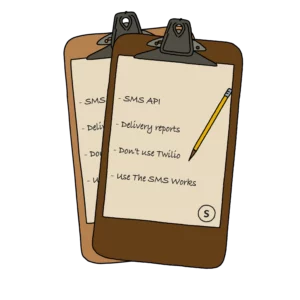What is web SMS?
Web SMS refers to the process of sending SMS messages from a web-based platform or service rather than through a traditional mobile phone.
Users typically create an account and login where they can manage all their outbound and inbound text messages.
What’s the difference between web SMS and bulk SMS?
There’s no difference at all.
Web SMS is exactly the same as bulk SMS.
What’s the difference between Web SMS and SMS API?
Web SMS (or bulk SMS) is when a user logs into a web based account to send their messages. It’s a complete web based system designed for non-technical people.
An SMS API allows users to automate the sending of messages from a system, app or website. Using SMS APIs requires some coding experience.

How many Web SMS providers are there?
Globally there are literally hundreds of web SMS providers, many of them also offering other messaging channels like WhatsApp, email and phones services.
In the UK, there are around 17 web SMS companies that have their head office in the UK.
Please note that all the bulk SMS vendors visited charge for failed SMS. You have to pay for all messages submitted, even messages that are not delivered.
What are the main features and tools of a web SMS account?
Each web SMS provider has different tools but the main features that most offer are as follows
- Message Sending (Single and Bulk SMS)
Single SMS: Users can send individual text messages to a specific recipient, similar to how traditional SMS works.
Bulk SMS: One of the most powerful features of Web SMS is the ability to send messages to multiple recipients at once. Bulk messaging allows businesses to reach hundreds or even thousands of recipients with a single click, making it ideal for marketing campaigns, promotions, and notifications. - Contact Management
Web SMS platforms often include contact management systems where users can store, organise, and manage contact lists.
Users can create contact groups (e.g., “Customers,” “Employees,” “VIP Clients”) to send targeted messages quickly without manually entering phone numbers. - Message Scheduling
Users can schedule messages to be sent at a specific date and time. This feature is useful for planning campaigns, sending reminders, or automating recurring messages like birthday greetings, appointment reminders, or marketing promotions.
Scheduling also allows businesses to send messages during peak engagement times, improving the chances that recipients will open and respond to the SMS. - Two-Way Messaging
Most Web SMS accounts offer two-way messaging capabilities, allowing recipients to reply to the messages they receive. This opens up opportunities for customer interaction, feedback collection, and real-time communication between businesses and their customers.
Two-way messaging is commonly used for customer support, surveys, or managing SMS appointments. - Message Templates
Pre-designed message templates save time by allowing users to reuse frequently sent messages. For example, businesses can create templates for standard messages like order confirmations, appointment reminders, and promotional offers.
These templates can often be personalised using dynamic fields (such as inserting the recipient’s name or order details), making each message feel unique and tailored. - SMS Personaliation and Customization
Many Web SMS platforms support bulk SMS personalisation by allowing dynamic content insertion. This means that each recipient receives a customised message, such as including their name, purchase history, or other personalized details.
Personalisation increases engagement rates and makes the communication more effective, especially for marketing and customer outreach. - Delivery Reports and Tracking
Web SMS accounts usually provide detailed delivery reports, which show whether messages were successfully sent and received. Users can track the status of each message, including whether it was delivered, read, or failed to send.
These reports provide valuable insights, particularly for businesses running SMS marketing campaigns, as they can measure the effectiveness and reach of their messages. - Analytics and Reporting
Advanced Web SMS platforms offer comprehensive SMS analytics tools to track message performance. Metrics such as delivery rates, response rates, and click-through rates (for SMS with embedded URLs) are commonly available.
Reporting features allow businesses to analyse their SMS campaigns, identify trends, and optimize future messaging strategies based on real-time data. - Long Message Support (Concatenation)
Traditional SMS messages are limited to 160 characters, but many Web SMS platforms support concatenation, which allows longer messages to be split into multiple SMS segments and then reassembled by the recipient’s phone.
This is particularly useful for businesses that need to send detailed information or promotional messages that exceed the standard character limit. - Unicode Support (International Characters)
Web SMS platforms support Unicode, allowing users to send messages in non-Latin scripts (such as Arabic, Chinese, Japanese, and Cyrillic) or with special characters and symbols. This is essential for businesses operating in global markets or communicating with non-English-speaking customers. - SMS Campaign Management
Web SMS platforms often include campaign management tools that allow businesses to run, monitor, and optimize SMS marketing campaigns. Features may include A/B testing, opt-in/opt-out management, and segmentation tools to ensure targeted and effective messaging.
Campaign management tools help businesses handle large-scale SMS efforts while staying organised and compliant with regulations like GDPR (General Data Protection Regulation). - Two-Factor Authentication (2FA)
Many Web SMS platforms offer two-factor authentication (2FA) for securing user accounts. Additionally, businesses can use Web SMS services to send 2FA codes to customers for account security purposes, such as during login processes or password recovery.
This adds a critical layer of security to sensitive transactions or online accounts. - Opt-In and Opt-Out Management (Compliance)
Compliance with telecommunications regulations (such as TCPA in the U.S. or GDPR in Europe) is essential when sending SMS. Web SMS platforms typically include opt-in and opt-out management tools to ensure that recipients can easily subscribe or unsubscribe from messaging services.
These tools help businesses remain compliant with legal regulations by providing clear opt-in consent mechanisms and respecting users’ rights to unsubscribe. - Multichannel Messaging Support
Some advanced Web SMS platforms go beyond SMS and support multichannel messaging, including email, voice, or even WhatsApp. This allows businesses to coordinate communications across different channels, ensuring that messages reach recipients through their preferred method of contact.
Having multichannel capabilities makes it easier for businesses to manage all customer communications from a single platform, reducing the need for multiple software solutions. - Keyword-Based Responses
Web SMS platforms often allow the setup of keyword-based responses, where recipients can text specific keywords (such as “JOIN,” “STOP,” or “HELP”) to trigger automated responses or actions.
This is particularly useful in marketing campaigns or customer service, where businesses can quickly handle inquiries or signups through simple, automated interactions. - International SMS Sending
Many Web SMS platforms offer international SMS support, enabling businesses to reach customers across the globe. This feature is critical for companies operating in multiple countries or regions, providing access to different mobile networks through a single platform.
With international support, businesses can send SMS to different time zones and markets without worrying about local regulations and mobile carrier restrictions. - Security and Encryption
To protect sensitive data, Web SMS platforms often include encryption protocols for messages sent and received. This is essential for businesses handling confidential information, such as financial transactions, customer details, or healthcare communications.
Platforms with high-security standards may also offer features such as IP whitelisting, SSL encryption, and secure API endpoints.
How much does it cost to use a web SMS account?
The web SMS account is always free to sign up and use, you simply pay for the messages that you send.
Different providers charge different amounts per text and most offer volume discounts.
In the UK, you can expect to pay between around 2.5 pence and 5 pence per text, depending on SMS volume.
How to choose a Web SMS company?
Choosing the right Web SMS provider is essential for businesses that rely on SMS for marketing, customer engagement, or internal communications.
With so many options available, it’s important to assess your needs and compare providers based on key factors. Here are some important considerations when selecting a Web SMS provider:
- Message Volume and Pricing
Volume Needs: Determine how many SMS messages you plan to send monthly. Most providers offer discounts for higher volumes.
Pricing Structure: Compare pricing models, including per-message costs, subscription fees, or bulk pricing packages, and ensure that the provider offers cost-effective solutions for your specific needs. Most web SMS companies charge you failed messages. Find a provider like The SMS Works that chargers you fairly for your SMS traffic.
- Features and tools including
Message Scheduling: Look for platforms that allow you to schedule messages for future delivery.
Two-Way Messaging: If customer interaction is important, ensure the platform supports two-way SMS communication, allowing recipients to reply.
API Integration: If you need to automate SMS through your own systems, check whether the provider offers API integration for seamless communication. - Global Reach and Network Coverage
If you plan to send SMS internationally, ensure the provider has global coverage with partnerships across multiple networks. This ensures your messages can reach recipients in various countries and regions reliably. - Ease of Use
Choose a provider with a user-friendly web SMS interface that allows for easy setup, contact management, and message composition. A good platform should be intuitive enough for non-technical users to manage campaigns without difficulty. - Reliability and Delivery Rates
The reliability of the provider is crucial. Ensure the provider offers high delivery rates and fast message delivery. Make sure that they don’t use low quality grey routes.
Delivery reports and tracking features can also help monitor the success of your campaigns and ensure messages are reaching recipients. - Compliance and Security
Ensure the provider complies with SMS regulations such as GDPR (General Data Protection Regulation) or TCPA (Telephone Consumer Protection Act) to avoid legal issues.
Security features, including encryption and two-factor authentication, are important, especially if your messages contain sensitive information. - Customer Support
Responsive and reliable customer support is vital, especially if you encounter issues or need help with integration or campaign management. - Scalability
Choose a provider that can scale as your business grows. Ensure they can handle increased messaging volume and more advanced needs as you expand your operations.
Conclusion
Choosing the right Web SMS provider requires evaluating your specific communication needs, from messaging volume to required features and global reach.
By considering factors like cost, ease of use, reliability, compliance, and support, you can select a provider that meets your current requirements and scales with your business.




